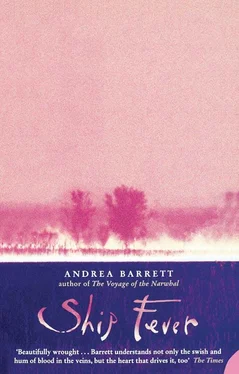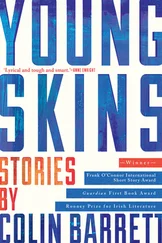Alec’s mother, who had faithfully written to him during his absence, without understanding that he would get her letters only in one great batch when he returned to Para, was during this hard time very kind to him. She visited Alec weekly at his uncle’s. And when he told her what he planned to do next, she encouraged him and secretly bought him two suits of clothes. [Ague—1855]
It was not as if Wallace and Alec traveled together throughout the Malay Archipelago, nor as if Wallace took Alec under his wing in any practical way. Alec was in Macassar when Wallace was in Bali; Wallace was in Lombok when Alec was in Timor; they both visited the Aru Islands, but in different years. And their situations were no longer as similar as they’d been in the Amazon. Wallace was still strapped for money, but his books had made him a reputation and the Royal Geographical Society had paid his first-class passage to Singapore aboard a fast steamer. Alec made a slow and uncomfortable voyage on three merchant ships and a filthy whaler. Wallace had with him an assistant, 16-year-old Charles, who helped capture, preserve, and catalog specimens, whereas Alec was all alone, and often overcome by details.
During the wet season of 1855, Alec was in Sarawak, in north-western Borneo. He’d heard tales of a lively Christmas house-party at the bungalow of Sir John Brooke, the English Rajah of the territory — all the Europeans in the out-stations being invited to enjoy the Rajah’s fabled hospitality, and so forth. But he had not been asked to join the party, and he never suspected that Wallace was there. Over that Christmas, and into January, Alec was miles east of the Rajah’s bungalow, collecting beetles and hunting orangutans in the swamps along the Sadong River.
For some weeks he’d been blessed with astonishing luck. Moving through the dense foliage he would hear a rustling overhead, then glimpse one of the reddish-brown apes swinging. Branch to branch, tree to tree, never touching the ground. His desire for possession seemed to carve a line in the air between his gun and his target; he aimed and a moment later the orangutan was his. Retrieving the body was more difficult, but here the native Dyaks helped him. As the orangutans fed on the fruit of the durian tree, of which the Dyaks were very fond, the Dyaks were happy to guide Alec to them and then, after the shooting, to fell the trees in which the bodies were trapped, or climb the trunks and lower the bodies down. With their help Alec obtained four full-grown males, three females, and several juveniles. Just before the ague hit again, he also shot another female high in a giant tree. While lashing the body to the carrying poles, one of his Dyak hunters found the orangutan’s little infant face-down in the swamp, crying piteously.
This orphan Alec brought back to camp with him. He could not feel guilty about shooting the infant’s mother; this was part of his work, what he was meant to do. But neither could he abandon the small creature who’d become his responsibility. While he lay on his cot, alternately burning and chilled, the infant orangutan clung to his clothes and beard and sucked on his fingers as he might at his mother’s breast. For a long time no one had touched Alec. He gave the infant sugar-water and rice-water and coconut milk through a quill, and later offered bits of fruit and sweet potato. The orangutan insisted on clinging to some part of his body at all times. And Alec found this peculiarly touching, despite the weakness and lassitude brought on by his fever. When a pair of strangers walked into his hut, he was flat on his back, in a violent sweat, with the infant curled like a cap around his head.
Wallace, Alec learned from the strangers, had been at the Rajah’s bungalow this whole time, staying on alone but for Charles and a Malay cook after the holidays had passed and the Rajah and his entourage had left. Having heard of Alec’s plight through some visiting Dyaks, Wallace had sent these two back to fetch him. The pair carried Alec through the swamp and the forest, on a litter made of bamboo poles. Some of his helpers followed with his belongings, including all his crates of insect specimens and the skins and skeletons of the orangutans. The infant rode on his chest.
Wallace had the ague as well. When Alec arrived at the Rajah’s bungalow, and first caught sight of the veranda and the huge teak beams, the wicker chairs and the spacious library, Wallace was desperately ill, and in bed. A few days later, when Wallace could get up, Alec was delirious. For ten days the men alternated bouts of fever as if they were playing lawn-tennis, but then finally, after large doses of quinine, both were well at the same time. In their weakened state they sat on the veranda, sipping arrack from narrow bamboos and talking. Wallace claimed that the bouts of ague stimulated his brain.
“Aren’t these beetles astonishing?” Alec said, pawing through the box at his feet. His clothes and person were clean, he had had a good dinner, he’d slept on a real bed. He felt wonderful. This Brooke, he thought, truly lived like a king. And even though the Rajah had welcomed Wallace and not Alec, Alec was consoled by the beautiful things he had to show for his isolation.
“In two weeks I collected more than 600 different kinds, sometimes a dozen new species a day — it’s bewildering,” Alec said. He held out a beetle with horns twice the length of its body. “Have you come across this one? And what do you make of the remarkable multitude of species here?”
Wallace smiled and turned the beetle delicately on its back. He said, “I have several of these; they’re charming. I do not see how a reasonable man can believe any longer in the permanence of species. All species, as you have seen yourself, constantly produce varieties. If this process goes on indefinitely, the varieties must move farther and farther from the original species, and some of these must, in time, develop into new species — but how and when does this happen? What is the method by which species undergo a natural process of gradual extinction and creation?”
“The method?” Alec said. Wallace passed the beetle back to Alec and Alec held it cupped in his palm. Since his first day in the archipelago he’d been haunted, vaguely, by the question Wallace now posed clearly: where had all these creatures come from? But Alec had had no time to theorize, caught up as he was in the urgency of trying to capture and name everything he saw.
“There must be a mechanism, ” Wallace said.
The rain was falling steadily. From the trees three Dyaks emerged and joined the men on the veranda; Wallace produced a piece of string and tried to show them how to play the child’s game of cat’s cradle. Much to Alec’s astonishment the Dyaks knew it better than he did. The three of them stood in a close circle, weaving figures he’d never seen before on each other’s hands and passing the cradle back and forth. When Alec joined them they netted his fingers together.
Later Wallace showed Alec the lone specimen he’d found of a huge new butterfly, which had brilliant green spots arrayed against the black velvet of its wings. “I have named it Ornithoptera Brookeana, ” Wallace said. “After our host.” In return Alec showed Wallace how happily his little orangutan, whom he’d named Ali, lay in his arms as he brushed its long brown hair. He tried not to feel jealous when Ali leapt into Wallace’s lap and licked his cheek. Wallace was Alec’s friend, but also his rival, and sometimes Alec longed for Wallace to have some failing. A certain coldness, say. Or an absent-mindedness, brought on by deep thinking. But it seemed there was no part of their lives in which Wallace could not surpass him.
The ague struck them both again on the following day — and to their great sorrow, it also struck Ali. Wallace, too weak himself to rise from bed, had Charles give the infant castor-oil to cure its diarrhea, but although this worked the other symptoms of fever continued; Ali’s head and feet swelled; and then he died. Everyone at the bungalow much regretted the loss of the little pet. When Alec’s own strength returned, he wept over Ali’s body and then decided to bring the skin and skeleton home with him. Ali was sixteen inches tall, four pounds in weight, with an arm-spread of twenty-four inches. Alec made these measurements, but he shrank from the task of preparing the specimen and thought to have Wallace’s Charles help him out. Wallace discouraged that.
Читать дальше
Конец ознакомительного отрывка
Купить книгу












